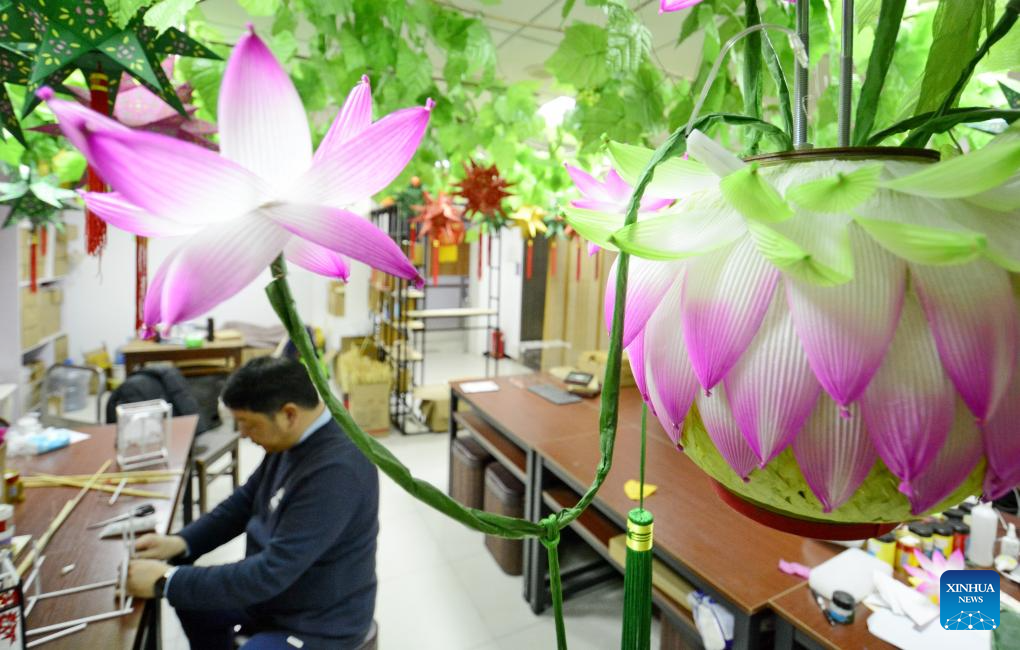
This photo taken on Feb. 10, 2025 shows the colored lanterns made by Mai Haijie at his studio in Beijing, China. Regarded as a symbol of auspicious and harmony, viewing colored lanterns to celebrate the Lantern Festival is one of the traditional activities on the fifteenth day of the first month on the Chinese lunar calendar.
In 2008, colored lantern (including Beijing colored lantern) was included in the second batch of national intangible cultural heritage list.
Born in 1974 in a family of lantern makers, Ma Haijie has been learning traditional techniques such as cutting samples, mixing paste and coloring from his grandfather and mother since he was a child. His family began to make lanterns in the Qing Dynasty, with the founder Huang Yuzhang, Ma Haijie's great-grandfather.
In recent years, Ma Haijie has also integrated bamboo weaving techniques in the production of lanterns in southern China with the production techniques of colored lanterns in Beijing, forming a unique style of lantern art.
Lately, Ma Haijie has volunteered to carry out teaching activities for schools and communities in Beijing, and has provided free training for disabled people for them to make a living. (Xinhua/Li Xin)
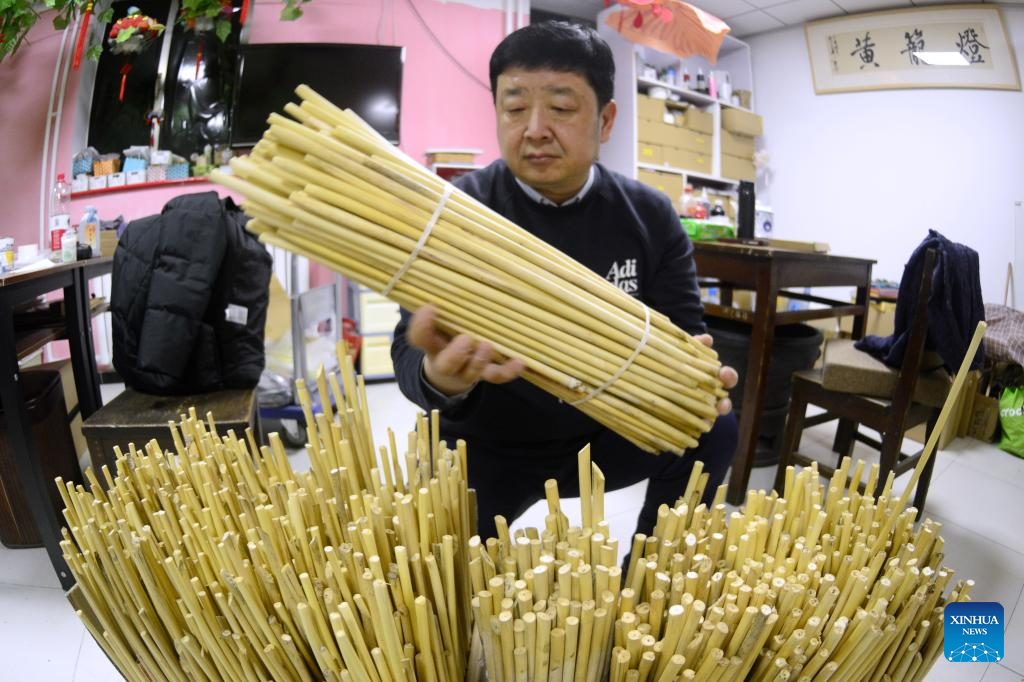
Ma Haijie selects raw materials to make colored lantern frames in Beijing, China on Feb. 10, 2025. Regarded as a symbol of auspicious and harmony, viewing colored lanterns to celebrate the Lantern Festival is one of the traditional activities on the fifteenth day of the first month on the Chinese lunar calendar.
In 2008, colored lantern (including Beijing colored lantern) was included in the second batch of national intangible cultural heritage list.
Born in 1974 in a family of lantern makers, Ma Haijie has been learning traditional techniques such as cutting samples, mixing paste and coloring from his grandfather and mother since he was a child. His family began to make lanterns in the Qing Dynasty, with the founder Huang Yuzhang, Ma Haijie's great-grandfather.
In recent years, Ma Haijie has also integrated bamboo weaving techniques in the production of lanterns in southern China with the production techniques of colored lanterns in Beijing, forming a unique style of lantern art.
Lately, Ma Haijie has volunteered to carry out teaching activities for schools and communities in Beijing, and has provided free training for disabled people for them to make a living. (Xinhua/Li Xin)
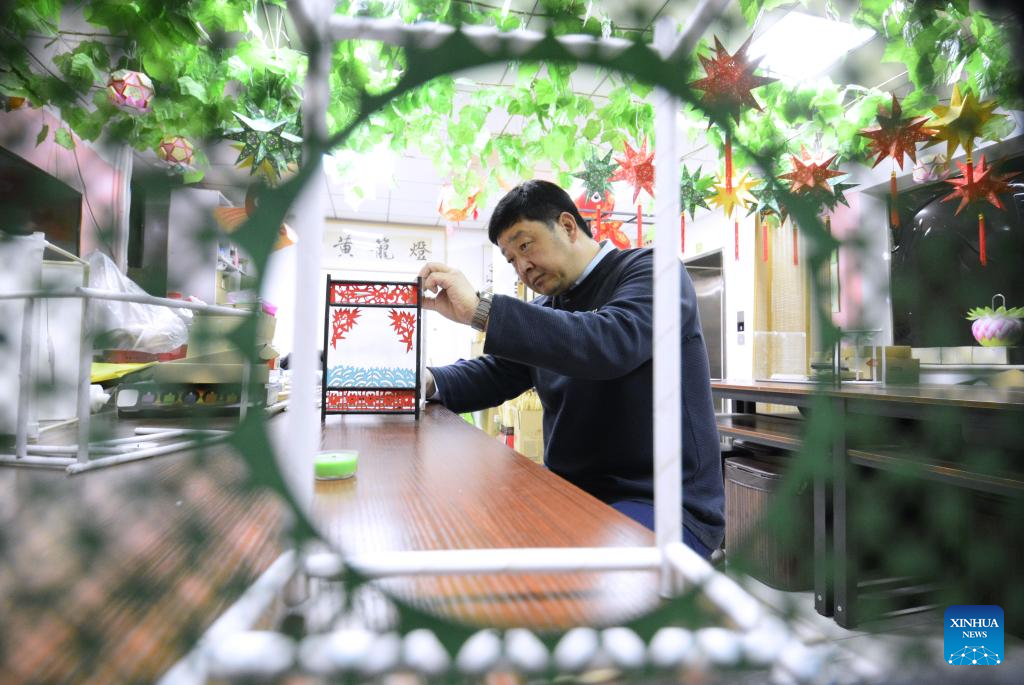
Ma Haijie makes a small traditional-style lantern at his studio in Beijing, China on Feb. 10, 2025. Regarded as a symbol of auspicious and harmony, viewing colored lanterns to celebrate the Lantern Festival is one of the traditional activities on the fifteenth day of the first month on the Chinese lunar calendar.
In 2008, colored lantern (including Beijing colored lantern) was included in the second batch of national intangible cultural heritage list.
Born in 1974 in a family of lantern makers, Ma Haijie has been learning traditional techniques such as cutting samples, mixing paste and coloring from his grandfather and mother since he was a child. His family began to make lanterns in the Qing Dynasty, with the founder Huang Yuzhang, Ma Haijie's great-grandfather.
In recent years, Ma Haijie has also integrated bamboo weaving techniques in the production of lanterns in southern China with the production techniques of colored lanterns in Beijing, forming a unique style of lantern art.
Lately, Ma Haijie has volunteered to carry out teaching activities for schools and communities in Beijing, and has provided free training for disabled people for them to make a living. (Xinhua/Li Xin)

Ma Haijie makes small traditional-style lanterns in his studio in Beijing, China on Feb. 10, 2025. Regarded as a symbol of auspicious and harmony, viewing colored lanterns to celebrate the Lantern Festival is one of the traditional activities on the fifteenth day of the first month on the Chinese lunar calendar.
In 2008, colored lantern (including Beijing colored lantern) was included in the second batch of national intangible cultural heritage list.
Born in 1974 in a family of lantern makers, Ma Haijie has been learning traditional techniques such as cutting samples, mixing paste and coloring from his grandfather and mother since he was a child. His family began to make lanterns in the Qing Dynasty, with the founder Huang Yuzhang, Ma Haijie's great-grandfather.
In recent years, Ma Haijie has also integrated bamboo weaving techniques in the production of lanterns in southern China with the production techniques of colored lanterns in Beijing, forming a unique style of lantern art.
Lately, Ma Haijie has volunteered to carry out teaching activities for schools and communities in Beijing, and has provided free training for disabled people for them to make a living. (Xinhua/Li Xin)
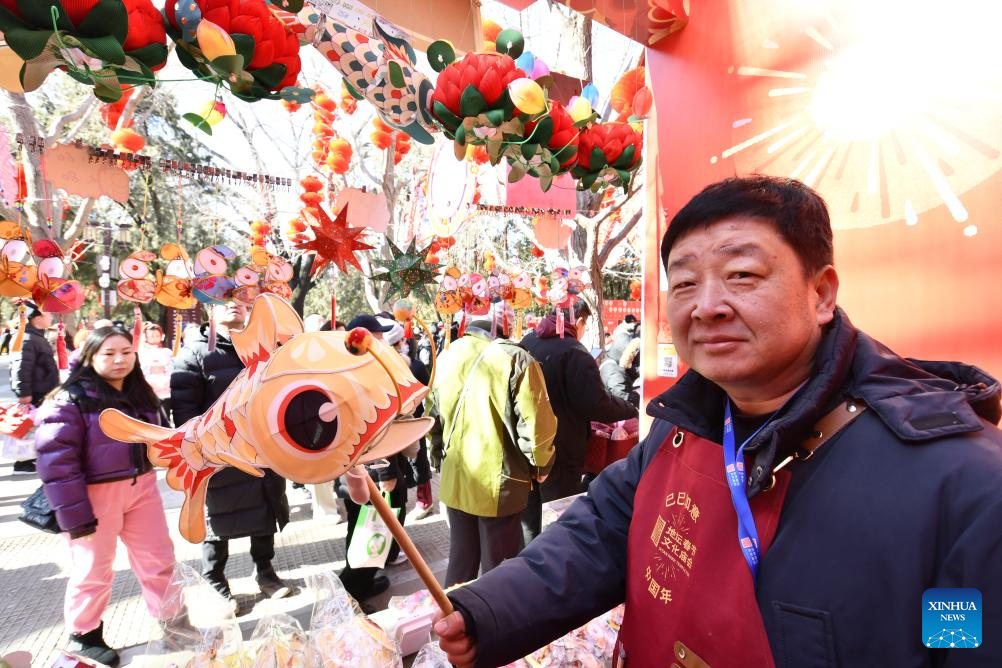
Ma Haijie shows his colored lantern work at Di Tan temple fair in Beijing, China, Feb. 3, 2025. Regarded as a symbol of auspicious and harmony, viewing colored lanterns to celebrate the Lantern Festival is one of the traditional activities on the fifteenth day of the first month on the Chinese lunar calendar.
In 2008, colored lantern (including Beijing colored lantern) was included in the second batch of national intangible cultural heritage list.
Born in 1974 in a family of lantern makers, Ma Haijie has been learning traditional techniques such as cutting samples, mixing paste and coloring from his grandfather and mother since he was a child. His family began to make lanterns in the Qing Dynasty, with the founder Huang Yuzhang, Ma Haijie's great-grandfather.
In recent years, Ma Haijie has also integrated bamboo weaving techniques in the production of lanterns in southern China with the production techniques of colored lanterns in Beijing, forming a unique style of lantern art.
Lately, Ma Haijie has volunteered to carry out teaching activities for schools and communities in Beijing, and has provided free training for disabled people for them to make a living. (Xinhua/Li Xin)
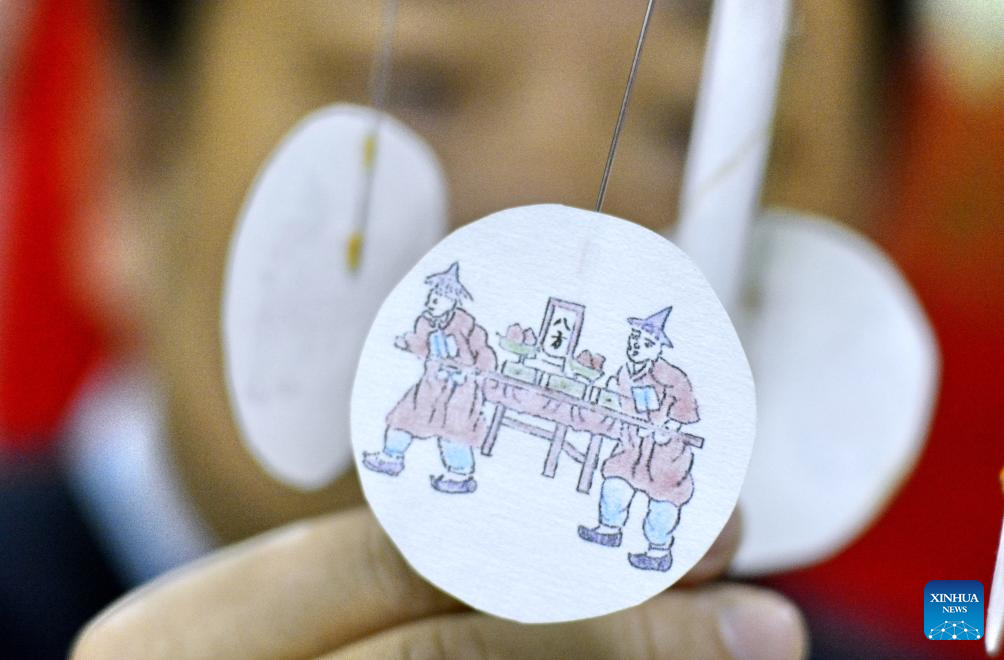
Ma Haijie makes lanterns with traditional story patterns in Beijing, China on Feb. 10, 2025. Regarded as a symbol of auspicious and harmony, viewing colored lanterns to celebrate the Lantern Festival is one of the traditional activities on the fifteenth day of the first month on the Chinese lunar calendar.
In 2008, colored lantern (including Beijing colored lantern) was included in the second batch of national intangible cultural heritage list.
Born in 1974 in a family of lantern makers, Ma Haijie has been learning traditional techniques such as cutting samples, mixing paste and coloring from his grandfather and mother since he was a child. His family began to make lanterns in the Qing Dynasty, with the founder Huang Yuzhang, Ma Haijie's great-grandfather.
In recent years, Ma Haijie has also integrated bamboo weaving techniques in the production of lanterns in southern China with the production techniques of colored lanterns in Beijing, forming a unique style of lantern art.
Lately, Ma Haijie has volunteered to carry out teaching activities for schools and communities in Beijing, and has provided free training for disabled people for them to make a living. (Xinhua/Li Xin)
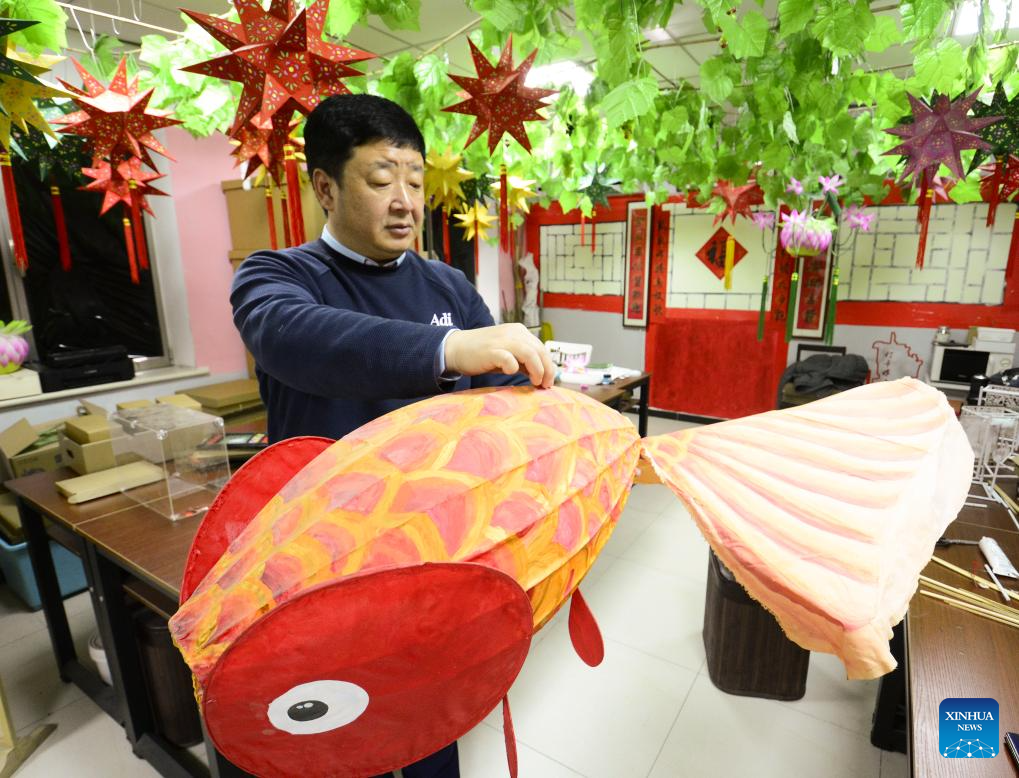
Ma Haijie shows a traditional-style lantern he made in Beijing, China on Feb. 10, 2025. Regarded as a symbol of auspicious and harmony, viewing colored lanterns to celebrate the Lantern Festival is one of the traditional activities on the fifteenth day of the first month on the Chinese lunar calendar.
In 2008, colored lantern (including Beijing colored lantern) was included in the second batch of national intangible cultural heritage list.
Born in 1974 in a family of lantern makers, Ma Haijie has been learning traditional techniques such as cutting samples, mixing paste and coloring from his grandfather and mother since he was a child. His family began to make lanterns in the Qing Dynasty, with the founder Huang Yuzhang, Ma Haijie's great-grandfather.
In recent years, Ma Haijie has also integrated bamboo weaving techniques in the production of lanterns in southern China with the production techniques of colored lanterns in Beijing, forming a unique style of lantern art.
Lately, Ma Haijie has volunteered to carry out teaching activities for schools and communities in Beijing, and has provided free training for disabled people for them to make a living. (Xinhua/Li Xin)
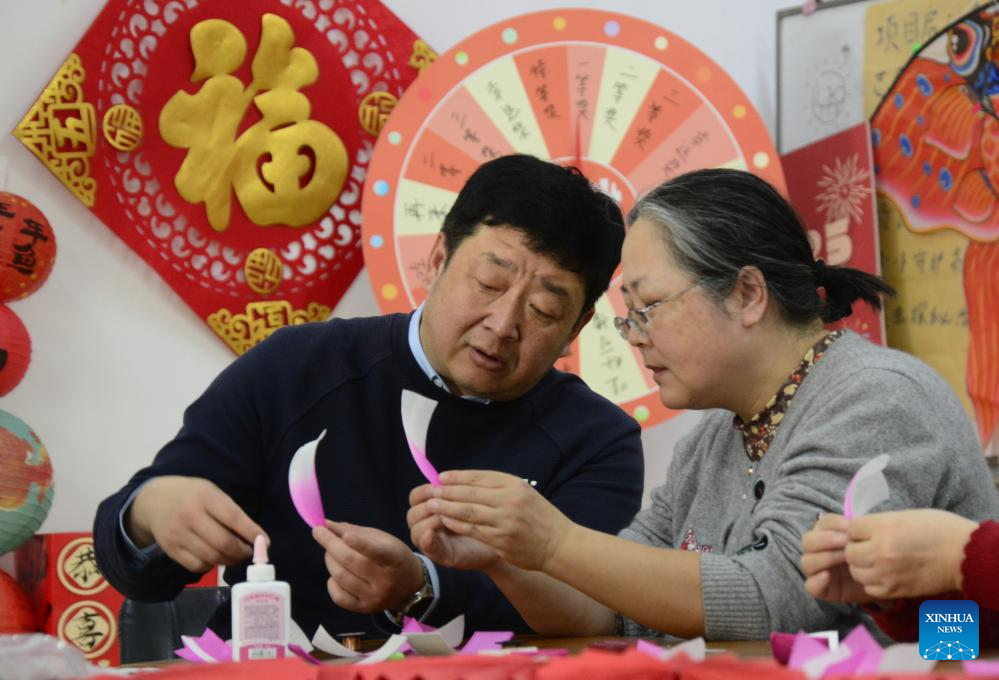
Ma Haijie (L) instructs a staff to make colored lantern at a vocational and health station for the disabled in Beijing, China, Feb. 10, 2025. Regarded as a symbol of auspicious and harmony, viewing colored lanterns to celebrate the Lantern Festival is one of the traditional activities on the fifteenth day of the first month on the Chinese lunar calendar.
In 2008, colored lantern (including Beijing colored lantern) was included in the second batch of national intangible cultural heritage list.
Born in 1974 in a family of lantern makers, Ma Haijie has been learning traditional techniques such as cutting samples, mixing paste and coloring from his grandfather and mother since he was a child. His family began to make lanterns in the Qing Dynasty, with the founder Huang Yuzhang, Ma Haijie's great-grandfather.
In recent years, Ma Haijie has also integrated bamboo weaving techniques in the production of lanterns in southern China with the production techniques of colored lanterns in Beijing, forming a unique style of lantern art.
Lately, Ma Haijie has volunteered to carry out teaching activities for schools and communities in Beijing, and has provided free training for disabled people for them to make a living. (Xinhua/Li Xin)
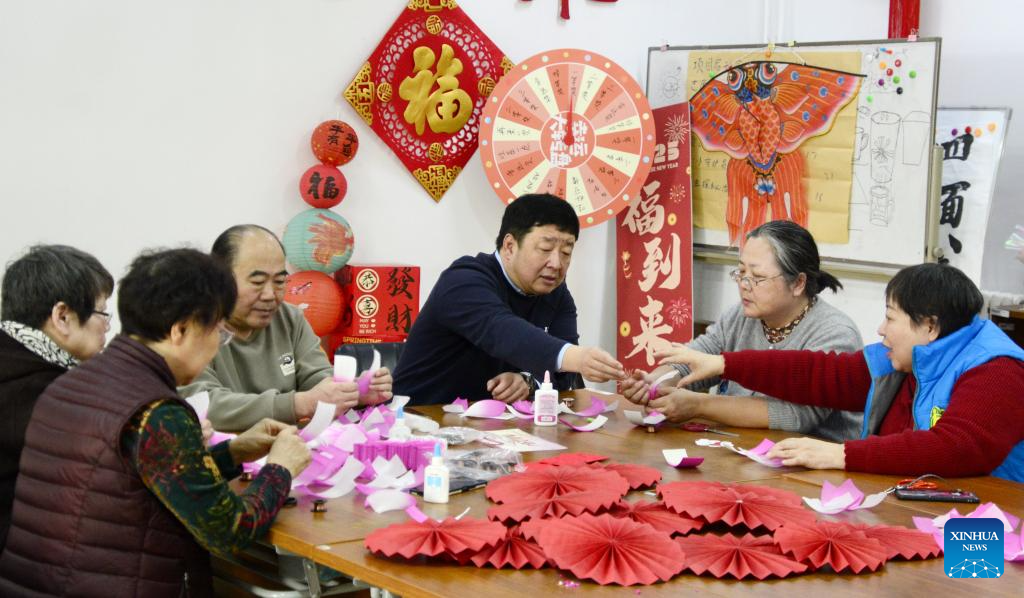
Ma Haijie (3rd R) instructs disabled people and staff members to make colored lanterns at a vocational and health station for the disabled in Beijing, China, Feb. 10, 2025. Regarded as a symbol of auspicious and harmony, viewing colored lanterns to celebrate the Lantern Festival is one of the traditional activities on the fifteenth day of the first month on the Chinese lunar calendar.
In 2008, colored lantern (including Beijing colored lantern) was included in the second batch of national intangible cultural heritage list.
Born in 1974 in a family of lantern makers, Ma Haijie has been learning traditional techniques such as cutting samples, mixing paste and coloring from his grandfather and mother since he was a child. His family began to make lanterns in the Qing Dynasty, with the founder Huang Yuzhang, Ma Haijie's great-grandfather.
In recent years, Ma Haijie has also integrated bamboo weaving techniques in the production of lanterns in southern China with the production techniques of colored lanterns in Beijing, forming a unique style of lantern art.
Lately, Ma Haijie has volunteered to carry out teaching activities for schools and communities in Beijing, and has provided free training for disabled people for them to make a living. (Xinhua/Li Xin)



